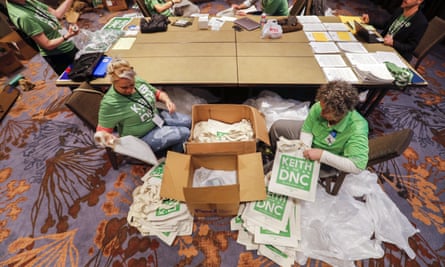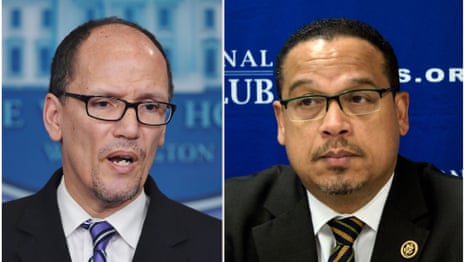Democrats will on Saturday elect a new leader for the era of Trump, after a months-long contest that has exposed lingering divisions in the party.
Hillary Clinton’s devastating election loss and a surge of liberal activism in response has reshaped what might have been an insiders’ affair into a national competition that observers have cast as a battle for the soul of the party.
The contest is led by former labor secretary Tom Perez, who backed Clinton and was considered as her running mate, and Minnesota representative Keith Ellison, who supported Vermont senator Bernie Sanders and is the favorite of grassroots activists and progressive groups.
“Here’s a party hanging in the balance right now,” the New York mayor, Bill de Blasio, who endorsed Ellison, said at a reception for the congressman on Friday night. “Right now – in the next 24 hours – people in this room will decide the fate of the Democratic party. That will decide the fate of our nation. As simple as that.”
At dueling parties on Friday night, the frontrunners urged unity.
“ We’ve got to come out of this thing hands strong,” Ellison said, talking over shouts of “Keith!” “No one benefits from us fighting each other than Trump and those crazy rightwing governors and all the rest of them.”
He added: “But just because I’m asking you to be unified doesn’t mean you can’t be passionate, fighting for your candidate.”
Across the hall, Perez, who is believed to have an edge, predicted Democrats would leave Atlanta as an energized and unified front.
“I am absolutely confident that tomorrow will be unity Saturday,” Perez shouted, his voice hoarse from weeks of campaigning. “A united Democratic party is not only our best weapon, it’s Donald Trump’s worst nightmare.”
Campaign signs cluttered the eighth-floor hallway of the Westin Peachtree Plaza in downtown Atlanta, where the three-day party meeting was being held. Supporters crowded the entrance to the main ballroom, chanting and even singing for their candidate.
Progressive activists and groups have ratcheted up their support for Ellison.
“If Keith doesn’t win tomorrow, I think it is a huge loss for the DNC and the Democratic party,” said Eric Thut, executive director of Netroots Nation, who is not a voting member. “The Democrats have a real opportunity here to tap into the power of the grassroots.”
In a letter, a coalition of progressive organizations argued that Ellison was the only candidate who could bridge the factional divide and fuse an energized activist base and the party establishment.
“The DNC has traditionally operated separate from groups like ours that organize millions of people,” wrote in the the letter that was signed Progressive Change Campaign Committee, MoveOn.org, Democracy for America, 350 Action and Presente Action, in an implicit criticism of Perez.
“If Keith Ellison was chair and proposed partnering on state-level voter registration activities and issue mobilization rallies, we would be eager to engage in that conversation.”

Ellison, the first Muslim member of Congress, has been dogged by criticism from Jewish groups and donors over past support for the Nation of Islam and recently resurfaced comments on Israel.
The Senate minority leader, Chuck Schumer, one of Ellison’s earliest supporters, said in a letter to DNC members that he trusts the congressman on Israel and believes he would combat antisemitism as chair.
Perez, the son of immigrants from the Dominican Republic, has won support from Latino organizations.
“The last 18 months have been among the most tumultuous in recent history for immigrants, the Latino community and the nation,” Cristóbal Alex, president of the Latino Victory Fund, wrote in an op-ed published in the Hill on Friday.
“It is in this desperate time that we need a leader of the Democratic party who can unify, rebuild and fight against Trump.”
In the run-up to Saturday’s vote, Perez and Ellison rolled out dozens of endorsements, with neither campaign yet claiming to have cleared the 224-vote threshold. Last week Perez claimed to have 180 votes, 44 shy of victory. Ellison’s campaign disputed the count. Voting will continue for multiple rounds until one candidate secures the majority of the vote.
Jaime Harrison, chair of the South Carolina Democratic party who dropped out of the race on Thursday and endorsed Perez, sounded confident that the vote would only take one round.
“We’re going to be unified and we’re going to get this thing done on the first ballot,” Harrison told supporters on Friday night.
Other candidates in the race were hoping for deadlock on the first round, to clear a path through the center on a second or third ballot. Pete Buttigieg, the mayor of South Bend, Indiana, offered himself as a “compromise candidate”, someone not closely associated with either wing.
In the event, Buttigieg withdrew from the race before voting began, choosing not to endorse either Perez or Ellison. The mayor, who is believed to have higher political ambitions, told reporters on Friday he had commitments from roughly 30 members, enough to tip the scale for one of the frontrunners on a first ballot.
“We saw the potential of doing well on multiple ballots but we can do the math,” he said on Saturday. “It is time for this process to move toward a solution that we can all get on board with.”
Democrats did not expect to hold the contest. If Clinton had won, she would have picked the next chair, as Barack Obama did when he won the presidency in 2008.
On Friday, Clinton surprised Democrats with a recorded video in which she promised to stay active in the party and in the opposition movement to Trump.
“Let resistance plus persistence equal progress for our party and our country,” Clinton said in the video. “Keep fighting. I’ll be right there with you every step of the way.”
The race for DNC chair evolved into a fully fledged campaign complete with bus tours, signs and pins. At its height, the field of candidates swelled to double digits before winnowing to seven in the days leading up to the vote.
The candidates participated in four regional “future forums”, a slate of debates and months of meetings with members, backroom deals and politicking. In the end, the roughly 442 voting members – a group of party functionaries, including state party chairs, activists, donors and some elected officials – will decide.
